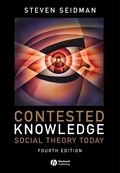
Contested Knowledge is a well-established text offering up-to-date perspectives on social theory by one of the most important thinkers of our time. Steven Seidman tracks the work of major figures in the field, from the classical sociologists - Durkheim, Marx, Weber - to contemporary theorists -- Giddens, Foucault, Bourdieu, and Judith Butler. By exploring contemporary social theories and movements -- including feminism, post-structuralism, African-American thought, and queer theory -- the author provides a compelling look at sociological theory and its established canon. Contested Knowledge combines social analysis and moral advocacy, showing how social theory can and does - and sometimes doesn't - work within the public and political sphere. Highlights of the fourth edition include a new section on globalization. A major revision of social theory has been to shift the unit of social analysis from the independent nation state or discrete-bounded society to the global or world order, and to emphasize the importance of situating key social dynamics within a wider global context. The updated version includes a new section entitled Theories of Global and World Order, offering three timely chapters, 'Capitalism as a world order', 'The making of a global order', and 'Civilizational clash or the return of Empire?' The book's introduction is more in-depth and existing chapters are widely revised. With sustained historical and theoretical argument, the text successfully balances the tensions existing between philosophical, scientific, and moral modes of theorizing. The challenges and changes to the classical tradition found within current social theory are explored. Contested Knowledge is a thoughtful and rigorous, yet highly accessible and reader-friendly account of social theory. INDICE: Preface Acknowledgments Introduction Part I: The Rise of the Classical Tradition: Introduction 1. The Idea of a Science of Society: The Enlightenment and Auguste Comte 2. The Revolutionary Theory of Karl Marx 3. The Promise of Sociology: Emile Durkheim 4. The Ironic Social Theory of Max Weber Afterword Part II: Rethinking the Classical Tradition: American Sociology: Introduction 5. The Grand Theory of Talcott Parsons and of Peter Berger and Thomas Luckmann 6. The Scientific Theory of Randall Collins and Peter Blau 7. The Moral Sociology of C. Wright Mills and Robert Bellah Afterword Part III: Rethinking the Classical Tradition: European Theory: Introduction 8. The Critical Theory of Jurgen Habermas 9. Stuart Hall and British Cultural Studies 10. The CriticalSociology of Anthony Giddens and Pierre Bourdieu Afterword Part IV: Revisionsand Revolts: The Postmodern Turn: Introduction 11. Post-Structural Theory: Jacques Derrida, Jean-Francois Lyotard, and Jean Baudrillard12. Michel Foucault's Disciplinary Society 13. Zygmunt Bauman's Sociology of Postmodernity Afterword Part V: Revisions and Revolts: Identity Politics and Theory: Introduction 14. Feminist and Gender Theory 15. Critical Race Theory 16. Lesbian, Gay, and Queer Theory 17. Colonial Discourse Studies Afterword Part VI: Revisions and Revolts: Theories of World Order:Introduction18. From Nation to Global Order: David Held and Mary Kaldor19. Global Capitalism: Immanuel Wallerstein and ManuelCastells20. The Return of Empire? Hardt and Negri, Harvey, MannEpilogue: Social Theory Today Index
- ISBN: 978-1-4051-7001-7
- Editorial: Blackwell
- Encuadernacion: Rústica
- Páginas: 328
- Fecha Publicación: 01/02/2008
- Nº Volúmenes: 1
- Idioma: Inglés
